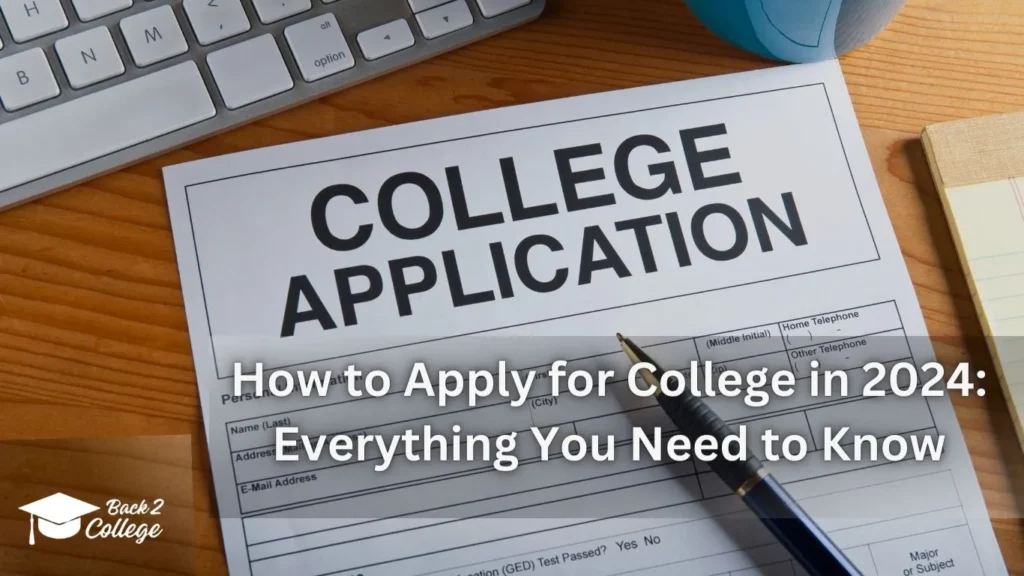Understanding how to apply for college is the first requirement to get into a reputable institution for your higher studies. Many students fail to secure admission to their desired college due to the lack of this knowledge and not having enough prep time for themselves.
To apply for colleges, you’ll have to:
- List down your preferred colleges
- Fill in details & portfolio in your college application
- Send it to the colleges during the admission period
It seems quite simple, doesn’t it? But there is more to applying for college than it meets the eye.
You won’t be able to get into your preferred college just by having good scores. There are factors like early applications, essays, extracurriculars, and a lot more when it comes to applying for college.
Don’t worry, as in this guide, I will go through everything you need to know regarding your college application, the requirements you have to fill out, the documents you need, and more.
College Application Timeline
Your college application preparations should begin early in your high school year. This isn’t a must because you can begin your college application process during the summer between junior and senior year of high school, but early planning allows you to manage deadlines effectively.
Here is a general timeline for college application so that you can get prepared early:
Sophomore Year
This should be the beginning of your college application process. You’ve just started high school and are starting to get a hint of higher education. There isn’t any requirement to go all out from your sophomore year, but you should start planning your future. During this time, you should:
- Explore your interests, strengths, and potential career paths.
- Attend college fairs and information sessions.
Junior Year
From your junior year, it is time to find colleges that align with your interests and build your college profile. By this, I mean build your portfolio that you will showcase in your college application. This should include:
- Taking on challenging courses to build a strong academic profile.
- Preparing for standardized tests (SAT or ACT).
- Finding ECAs (Extra Curricular Activities).
- Creating a preliminary college list.
Summer Before Senior Year
While you could avoid thinking about colleges before senior year starts, the summer before is the ideal time to set things in motion. This way, you won’t feel much pressure when the new school year begins and you are just starting with a college search.
I recommended fixing your final destination during this period as well as improving your social image for the college resume. To do so, you can do the following:
- Visit colleges (in-person or virtually).
- Finalize your college list based on preferences.
- Take part in social work like public services (optional)
Fall of Senior Year
This is the time when everyone starts to get serious about their college applications. Students who haven’t taken steps for college beforehand will have to put in extra work hours if they want to have an effective college resume.
September-October
You should take care of your academic & extra-curricular requirements by this period. This includes:
- Registering for standardized (if your chosen colleges require them).
- Requesting letters of recommendation from teachers.
- Obtaining certifications for your ECAs.
November-December
Apart from the creative section of your application, all the other portions should be completed by this time.
Keep in mind that early decision submissions will also start during this period, so you need to put in the effort if you want to get those early acceptance letters.
- Complete your college essays and personal statement.
- Make the final tweaks to your application.
- Submit early applications (if applicable).
Spring of Senior Year
By this time, your application should be complete, and you will just be looking for potential college options after the initial results from early decisions.
January-February
Most colleges will start taking admission applications by this time. You should make your picks and start sending out the applications to colleges. If you are hoping to secure any type of financial aid, then you will have to submit those applications as well. This involves both government and private aid.
Therefore, during this time, you should:
- Submit regular decision applications.
- Apply for financial aid (FAFSA and CSS Profile).
March-April
During this period, you will be getting your results from colleges. You will have to:
- Compare acceptance letters and financial aid packages &
- Make your final decision.
How to Research for Colleges
Now that you have a general idea of your college application and how you should follow the process, let’s get into researching colleges. You can just pick a college at random and hope that they will pick you.
No, that is a surefire way to get rejected from colleges. You need to conduct your own research and find a college that suits you well. This way, you will be able to craft perfect essays for your preferred colleges, as it will reflect your desire & determination to join their ranks.
Here are a few factors that you should consider when choosing colleges for your list:
Types of Colleges
There are three types of college you will be able to join after high school:
- Research Universities
- Liberal Arts College &
- Community College
Research Universities
As the name suggests, these colleges offer higher academic programs with superior research facilities. This is mainly aimed at students who follow a passion for academic revolutions and innovations.
Characteristics:
- Extensive academic programs, research facilities, and graduate schools.
- Large student populations.
- Faculty engaged in cutting-edge research.
Consider If:
There are topics you want to dedicate your whole career to, and you’re passionate about research, want diverse opportunities, and thrive in a bustling environment.
Liberal Arts Colleges
For those of you who don’t want to delve into research, data collection, and innovations but want to jump into a more traditional and philosophical-based education, then liberal arts colleges are one of the best choices out there.
Characteristics:
- Emphasis on a broad-based education, critical thinking, and interdisciplinary learning.
- Smaller class sizes and close faculty-student interactions.
- Focus on the liberal arts subjects like humanities, social sciences, and natural sciences.
Consider If:
You value personalized attention, want a well-rounded education, and enjoy exploring various subjects.
Community Colleges and Vocational Schools
Those of you who want to gain practical skills and higher degrees to tackle the job market with affordable costs should pick community colleges and vocational schools.
Characteristics:
- Two-year institutions offering associate degrees and certificates.
- Practical skills for immediate employment or transfer to four-year colleges.
- Affordable tuition.
Consider If:
Cost-effective education, flexibility, and career-specific training are what you are looking for from a college.
Location
The location of your college should be considered as one of the priorities when choosing colleges. Some may want to stay near home while others may want to avoid that. You will have to consider the climate, distance from home, and cultural environment of the surroundings before choosing colleges.
Also, make sure to check and explore urban, suburban, and rural settings before you finalize a location. I personally think it is better for the students to go ahead and visit the campus and surrounding areas to get a better understanding of the location & culture.
Size and Campus Culture:
You will be spending at least 2 to 4 years of your in the college, so it is better to get a good idea of the campus, the number of students, and the overall culture there. To do so, you can do the following:
- Research student-to-faculty ratios.
- Find out about dining, hostels, and teacher-student interactions across the campus.
- Attend virtual campus tours and information sessions (manual is better).
- Connect with current students through social media.
Academic Programs
College is where you are going to get your higher education, but if the subject you want to study isn’t listed there, then there is no point in applying there, is it?
Yes, most students don’t really know what major they want to get into and discover their passions by taking classes. That being said, you should already have a basic idea of what fields inspire you and what don’t.
Therefore, when listing colleges, make sure to look beyond general majors. Try to investigate specific concentrations, minors, and interdisciplinary opportunities.
That’s not all, and you should also try to join a college that offers future-proofing. So, select the ones that offer and explore research opportunities, internships, and study abroad programs.
Consider the Tuition Costs
It is important to figure out the overall tuition cost and whether you can afford it or not. This also depends on residency. For example, public colleges often have lower tuition rates for in-state residents.
The same can be said for public and private colleges. Public colleges cost less, while private colleges may have tuition but offer more financial aid opportunities.
You will also need to consider the hidden costs that are beyond tuition, like textbooks, lab fees, housing, and meal plans.
Financial Aid and Scholarships
One of the primary reasons for stress among college students is maintaining their tuition fees. You shouldn’t pick a college that digs you into a financial grave. So, before applying, make sure to check tuition costs, room and board fees, and additional expenses.
Don’t forget to explore different types of financial aid, merit-based scholarships, need-based aid, and work-study options that a college offers and whether you are eligible or not. It is better to apply to the ones that may offer some sort of financial aid during your student years.
Understanding Application Components
When you are creating your application, there are some major points that you will have to keep in mind. Generally, students will apply through some sort of college application platform (Common App, mostly).
However, there are cases where students can apply to a college through direct application.
In that case, you will either have to apply from your preferred college’s personal website or have to contact the admission office and fill out their application form manually.
Here, I’ve listed some common application materials that you will have to provide in your college application. You may have to include additional information based on your preferred college’s demands.
Personal Information
You will have to provide personal details and official data on the following sectors:
Application Forms
If you are applying directly through a college’s application portal or filling out manual application forms, you will have to share your personal details. Therefore, make sure to:
- Provide accurate details about your background, contact information, and demographics.
- Highlight any unique circumstances (first-generation college student, military family, etc.).
Application Portals
Most colleges in the US and around the Western Globe take their application requests through application portals like the Common App or Coalition App. Here, you will have to do the following:
- Create an account and keep track of login credentials.
- Fill out every section of the application.
- Select the colleges you want to apply through the portal.
- Submit your complete application in time.
Transcripts and Test Scores
You will have to include your academic performance and achievements in your college applications so that they can evaluate your academic career and determine whether you will fit their programs or not. The transcripts and test scores you will have to provide are the following:
High School Transcripts
Request transcripts from your guidance counselor. If you have retaken some subjects, then it is better to send both transcripts, but only if they show a significant difference in your result. Make sure that your transcripts include all courses, grades, GPA, and class rank throughout your high school year.
Standardized Test Scores
There are some colleges that won’t accept your application unless you have attached your Standardized test scores. There are also exceptions, so make sure whether your college needs these scores or not.
In my opinion, it is better to attach them as this allows the evaluators to further determine your cognitive abilities and academic prowess. So make sure to:
- Send official SAT or ACT scores directly to colleges or connect the digital record to your application portal.
- Understand score choice policies and subject priorities (for SAT II especially).
- Check whether you need to take additional tests like IELTS or TOEFL (for international students).
- If you want to earn extra credits and have taken AP courses, then make sure to add those details as well.
Letters of Recommendation
A big part of your college application is the recommendation letters. Students with good recommendations will secure their places more easily than students who don’t have any or a generic one.
Choose Wisely
You should select teachers, counselors, or employers who know you well and are able to support the claims you have put out in your applications. Being authentic is the key to success here. Therefore, make sure to give your recommenders all the necessary details along with a resume and information about your goals.
Thank Your Recommenders
Not only is this a common courtesy, but sometimes colleges might want to contact your recommenders to confirm their thoughts. Therefore, make sure to always express gratitude to your recommenders for their time and effort.
Essays and Personal Statements
It can be said that more than 50% of the effectiveness of your college application depends on how good your essays and personal statements are. This is due to the fact that these admission essays and statements allow evaluators to judge you as a person and whether or not you will be a good fit for their student body.
That being said, you should express yourself and not impersonate anyone or make false statements to make your application more decorative. Every data you give will be examined thoroughly, and if you are caught providing misinformation, then it will be an instant rejection.
Personal Statement
Here, you will show who you are, the person you want to be, and why you think this institution is the best place for it. Therefore, make sure to:
- Reflect on your journey, values, and experiences.
- Be authentic and showcase your voice.
Supplemental Essays
Colleges will ask you to answer situation-based essays or give you free rein. This solely depends on the college you are applying to. When writing your essays, keep in mind to:
- Address college-specific prompts.
- Research each college’s mission & values and try to incorporate those in your writing.
Editing and Proofreading
The worst thing that you can do to your college applications is not review, proofread, and make changes to your essays and statements before submission. So:
- Revise your essays meticulously.
- Seek feedback from teachers, peers, or writing centers.
Resume or Activities List
If you want to have a good chance to get into college, then don’t forget to add your resume or mentionable activities list in your college application. This is where you will be able to showcase what you did outside of academic studies.
You can include your extra-curricular activities & achievements here, along with any positive social activities that you were part of.
Highlight Your Impact
When making your resume or activities list, make sure to:
- Include extra-curricular activities, leadership roles, community service, and work experience.
- Quantify your achievements (e.g., raised funds, organized events).
- Organize them chronologically or by category.
- Don’t overexaggerate.
Understand the Application Types and Deadlines
There are two types of applications that you can do for getting into a college:
- Early Decision &
- Regular Decision.
Early Decision (ED)
As the name suggests, these are the early applications you can make before colleges start their standard application deadlines. If you are using a platform, then the number of colleges you can apply will be limited (Generally, up to 5).
During the early decision, you should apply to your top-choice college early. Keep in mind that you should commit to attending if accepted. There are usually two deadlines for early applications. The ED I and ED II deadlines vary by college. So, you will have to research your targeted college’s policies carefully if you want ED to be in your favor.
Regular Decision
This is the standard application deadline that you will apply to. The deadline usually falls on January 1st, and most colleges will notify the applicants by April.
To help with both your Early Decision and Regular Decision, I recommend that you create a spreadsheet with application deadlines, requirements, and submission dates.
This will allow you to keep track of all the deadlines and apply accordingly.
Consider Financial Aids
Almost every college in the world offers some form of financial aid for their students. When applying for colleges, it is important to look for these aids and scholarships as well.
Generally, you will have to go with private scholarships or, government-funded scholarships, or aid & scholarships offered by your college.
FAFSA & CSS Profile
FAFSA
To apply for any government-funded scholarships, you will have to complete FAFSA or Free Application for Federal Student Aid. This helps to determine your eligibility for federal grants, loans, and work-study programs.
If you want to avail of that, then you will have to submit your FAFSA application as soon as possible, usually after October 1st of your senior year.
CSS Profile
The CSS profile is for students who don’t want to opt for or are ineligible for federal grants. Not every college has this, so make sure the ones you are selecting do so before submitting your CSS profile.
Scholarships and Grants
Here are a few types of scholarships and how you can avail of them if you are looking for financial aid options:
Merit-Based Scholarships
- Look beyond academic achievements. Scholarships exist for various talents, such as music, art, athletics, and community service.
- Research local organizations, foundations, and corporations offering scholarships.
- Apply early and meet all requirements.
Need-Based Aid
- Fill out the FAFSA to determine your financial need.
- Colleges may award grants or scholarships based on your family’s income and assets.
- Check if any additional documentation is required.
Institutional Scholarships
- Explore scholarships specific to each college.
- Visit college websites and financial aid offices for details.
- Some scholarships are automatic based on your application; others require separate applications.
External Scholarships
- Search online databases (e.g., Fastweb, Scholarships.com).
- Tailor your applications to match scholarship criteria.
- Beware of scholarship scams—never pay to apply!
Essay Scholarships
- Some scholarships require essays on specific topics.
- Craft thoughtful, well-researched essays.
- Seek feedback from teachers or mentors.
Local and Community Scholarships:
- Check with your high school guidance counselor or community organizations.
- Attend scholarship workshops and information sessions.
- Apply for scholarships offered by local businesses, rotary clubs, and nonprofits.
Final Thoughts: Steps for applying to College in 2024
If you know how to apply for college properly and are able to take the necessary steps, then there isn’t anything that can stop you from getting into the college of your dreams.
So, make sure to follow everything I have mentioned in this guide, especially the timeline, and you are good to go. Best of luck with your college applications!






